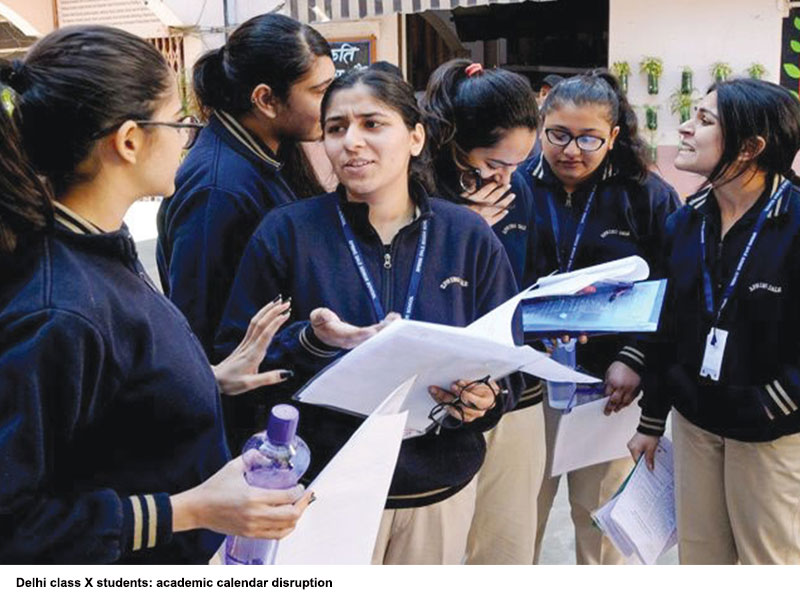
The rapid countrywide spread of the Coronavirus pandemic and subsequent national lockdown of all education institutions from Kg-Ph D has disrupted the academic year 2019-20 which was drawing to a close for 1.5 million schools (including CBSE, CISCE) Final assessments as well as various entrance examinations conducted by the NTA (National Testing Agency) have been postponed. Simultaneously, the second semester of universities was in full swing with more than 60 percent of academic transaction completed and apprenticeships and project assignments having commenced.
Therefore, the out-of-the-blue national lockdown started in mid- March has resulted in delays in completion of school board examinations, evaluation and certification. The postponement of the class XII school-leaving exams in particular, is delaying admission processes of colleges and other higher education institutions (HEIs) across the country even as the latter are in the thick of switching from conventional classroom lectures pedagogies to digital online learning systems and processes.
Against this backdrop of a comprehensive disruption of the academic calendar in school and higher education, governments, exam boards and regulators have been burning the midnight oil to manage this unprecedented situation to ensure that the current academic year is saved and the next year gets off to a smooth start.
The Central Board of Secondary Education (CBSE), the largest pan-India exams board with 22,145 affiliated schools countrywide, had already completed two-thirds of its school-leaving class X and XII exams when the Central government order to shut down all education institutions with immediate effect was issued on March 18. On April 1, CBSE issued a circular to all affiliated schools to promote classes I-VIII students to the next higher class and promote class IX and XI students on the basis of their term exam scores. The remaining 29 board exams — 11 for class XII students and 18 for class X students — will be held during the period July 1-15.
In the case of the Delhi-based Council for Indian School Certificate Examinations (CISCE), six subject exams for class X ICSE and eight for class XII ISC students are ending. In a circular dated May 1 to affiliated schools, the CISCE board says that eight days preparation time will be given to students after the date is announced post lockdown 3.0.
Inevitably, the delay of CBSE, CISCE (and 29 state exam boards) exams has disrupted the calendar of 39,931 undergrad colleges which admit students on the basis of these scores with toppers having the option of admission into top-ranked colleges of their choice.
After the CBSE, CISCE and state boards are finally held, their answer papers have to be evaluated, scored and school-leaving certificates issued, a process normally spread over three months. Therefore, anticipating delay in completion of this process, UGC has recommended postponing start of the new academic year to September 1, 2020 (cf. July 2020).
In a set of guidelines issued on April 29, UGC says: “Admission to the undergraduate and postgrad programmes for the session 2020- 21 may (i.e, should) be completed by 31.08.2020. If necessity arises, provisional admissions may also be made and relevant documents of qualifying examination may be accepted up to 30.09.2020. The academic session 2020-21 may commence from 01.8.2020 for old students and from 01.09.2020 for fresh students.”
In its ‘UGC Guidelines on Examinations and Academic Calendar for Universities’, UGC also provides recommendations for assessment and promotion of college and university students. The guidelines suggest that 50 percent of marks should be allotted on the basis of internal evaluation and the remaining 50 percent on the basis of performance in the previous semester. In the case of first year students whose previous semester results are not available, they should be promoted or detained on the basis of internal evaluation.
However, UGC spokespersons stress that the guidelines are advisory and universities have the autonomy to adjust them to local conditions. “In view of the location and diversity of universities and colleges, their level of preparedness, residential status of the students, status of the Covid-19 pandemic spread in different regions/states and other factors, the universities, after making a comprehensive assessment of all such factors may chart out a-plan for examinations and the academic calendar, to deal with any sort of exigency,” writes UGC secretary, Rajesh Jain, in a covering letter of the guidelines.
Delhi-based monitors of India’s chaotic education scenario are pleasantly surprised by the creative and constructive response of the usually ponderous bureaucracies of the school exam boards and UGC in particular. The situation may yet be saved.
Autar Nehru (Delhi)


























